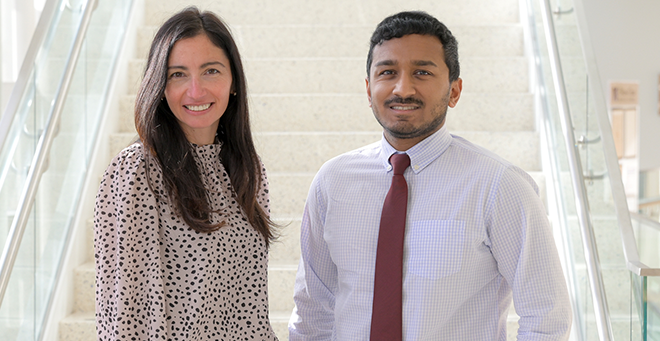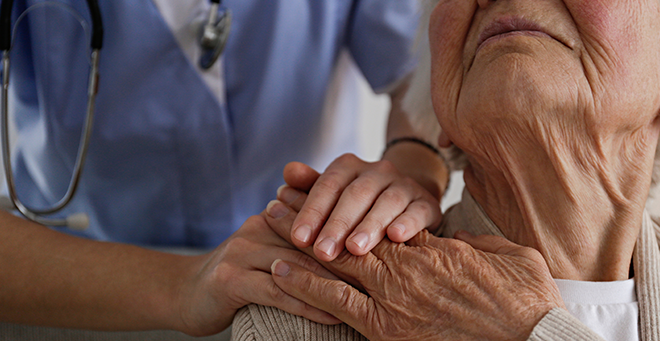
Photo: Colleen Locke
Three winners of the Massachusetts eHealth Institute’s (MeHI) 2025 Advancing Health Equity in Massachusetts (AHEM) Challenge are working with UMass Chan Medical School faculty to develop and advance technology to address maternal health, asthma, COPD and other health issues impacting underserved communities.
Startup digital health companies Candlelit Care, Greens Health and myBiometry are receiving pilot funding from the AHEM Challenge, run by the Massachusetts Technology Collaborative, to work with UMass Chan faculty. Each team received between $50,000 and $100,000 to help complete their projects.
The fourth AHEM challenge winner, Cultural Care Collective, is working with Mass General Brigham. MeHI is a division in the Massachusetts Technology Collaborative.
“MeHI’s AHEM Challenge awarded collaborations that have the potential to close equity gaps, address disparities and improve health outcomes across Massachusetts,” said Massachusetts eHealth Institute Director Keely Benson. “UMass Chan Medical School and these startups are taking a strong step forward to make health care more inclusive and impactful in our communities.”
Anna Whelan, MD, assistant professor of obstetrics & gynecology; and Martha Zimmermann, PhD, assistant professor of psychiatry & behavioral sciences, will be working alongside Candlelit Care to develop its mental health screening and treatment platform that improves early intervention for perinatal mood and anxiety disorders, with a focus on Black maternal health.
“There’s a lot I want to do in helping individuals who are dealing with mental health issues, but one thing I don’t have is that same lived experience as some of those individuals. I’m a mom. I’ve experienced postpartum depression and perinatal anxiety, but I have not experienced the challenges patients, particularly Black moms in America, face due to systemic inequities,” Dr. Whelan said. “By partnering with Candlelit Care, with a network built to support women of color, it’s allowing me to help advance the care offered to everyone dealing with perinatal mental health disorders.”
Candlelit Care is a virtual perinatal mental health provider that works with Medicaid and other health plans and hospitals to assist Black expectant mothers with point-of-care, ACA-mandated perinatal support services. Since 2019, the company has served over 100 women and trained over 200 doulas to identify and manage perinatal mood and anxiety disorders.
The goal of the study Whelan and Dr. Zimmermann are working on is to test feasibility of the Candlelit Care mobile app with 30 Black and/or African American patients being seen at UMass Memorial Health at risk of preventable perinatal mood and anxiety disorders.
Zimmermann said, “Part of my research has focused on digital mental health interventions that have so much promise in terms of reaching people where they are. There aren’t many high-quality digital interventions for perinatal mental health out there yet. As a junior faculty member, it’s exciting to see the development of this technology, be able to partner with someone with lived experience, and work with them on evaluating the effectiveness of the technology and see how it can be implemented into a medical setting.”
Lauren Elliott, founder and CEO of Candlelit Care, said the goal of the partnership with UMass Chan is to show how family care can be most impactful when integrated as a behavioral health service that's tailored to women of color and partnered with OB/GYN and clinical psychologists who can validate the impact, satisfaction, and improvement of birth and health outcomes among Black and African American women.
“This partnership with UMass Chan helps shine a light on symptoms that are often overlooked, inadvertently dismissed. This study reflects that partnership, and hopefully the patient population feels more seen and heard and feels like there’s a solution designed for their best outcome: having healthy babies and bonding experiences, adding more to joy to what is already a joyful experience, but could also be a fearful experience for this population,” Elliott said.
Daniel Amante, PhD, MPH, assistant professor of population & quantitative health sciences; and Jamie Faro, PhD, assistant professor of population & quantitative health sciences, are working with Greens Health to develop its AI-driven diabetes management solution focused on serving underserved communities through culturally tailored education and monitoring.

Photos: Bryan Goodchild, Faith Ninivaggi, Kaylee Pugliese
Finally, Apurv Soni, MD, PhD’21, assistant professor of medicine and co-director of the Program in Digital Medicine at UMass Chan, is teaming up with Community Care Cooperative to pilot myBiometry’s respiratory health platform that uses predictive insights to detect early asthma and COPD deterioration.
“Health care is changing, especially when it comes to the use of technology to monitor, diagnose and manage disease. These awards demonstrate that our faculty are living the UMass Chan mission to advance health and wellness of our diverse communities throughout Massachusetts by leading research and health care delivery projects,” said Nathaniel Hafer, PhD, associate professor of molecular medicine, who helped recruit UMass Chan faculty to the AHEM Challenge.

